It’s been yet another record-setting year for platform competition research
This blog is written by Joost Rietveld.
The year 2023 was another record-setting year for platform competition research. There currently are 641 published articles in the Platform Papers database—101 of those articles (16%) were published in 2023. That’s up from 91 published articles in 2022 and it represents the highest number of yearly additions to date.
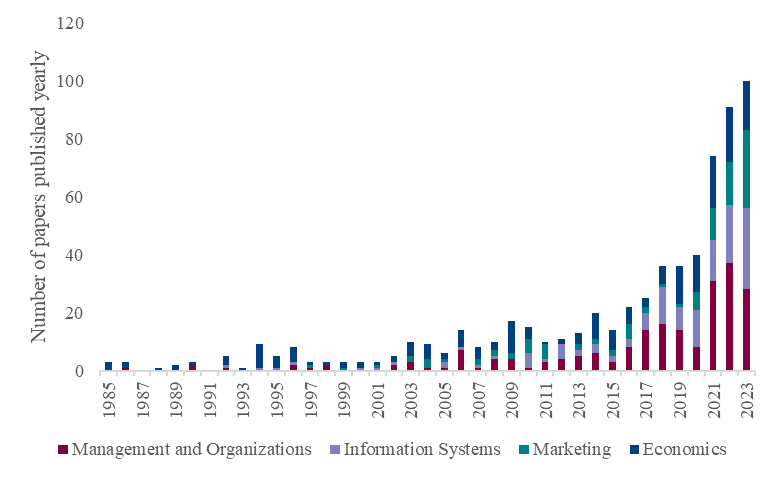
Platform competition research in marketing is on the rise. Whereas five years ago, in 2018, the share of marketing articles was less than three per cent, in 2023 marketing articles accounted for 27% of all published articles. Management and organizations (28%), information systems (28), and economics (17%) accounted for the remaining 73%.
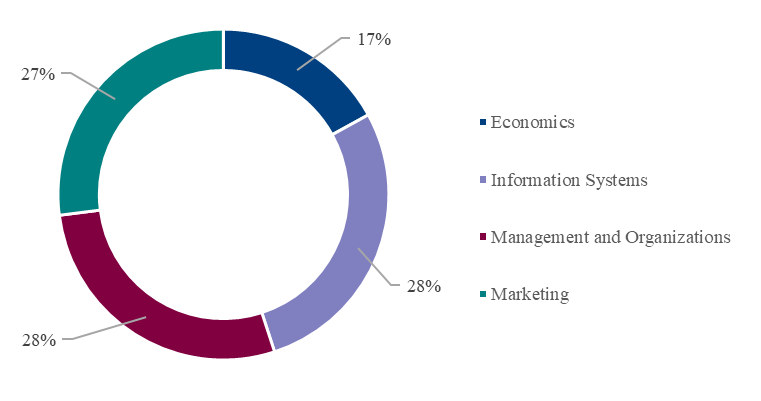
The two largest conceptual themes in platform competition research are research on network effects, platform pricing and winner-takes-all dynamics (32%) and research on ecosystem governance such as platform rule changes and algorithmic management (also 32%). However, research on network effects is down from 44% across all articles, while research on governance is up from 23%. This, in my view, tracks with recent discussions about platforms leveraging their dominance to exert unduly influence over their ecosystems. Other articles published in 2023 studied platform participant heterogeneity (e.g., the influence of superstar apps on demand spillovers; 26%) and platforms’ corporate scope (e.g., platforms’ competing with complementors; 10%). Articles can be assigned more than one conceptual theme.
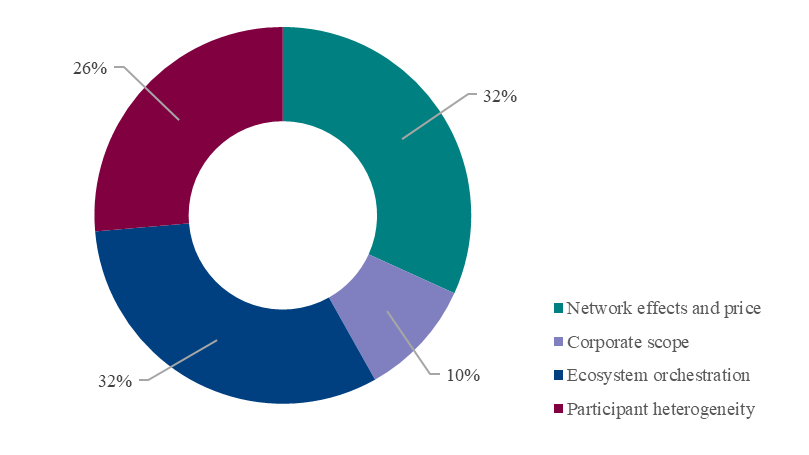
Management Science was the top journal for platform competition research with 28 published articles in 2023—a significant share of which (12 out of 28 publications) were published in the journal’s marketing department. Other popular journals include Information Systems Research (18 articles), Marketing Science (8 articles), Strategic Management Journal (6 articles), and the International Journal of Industrial Organization (5 articles). The remaining 35 articles were published in other journals such as the Journal of Industrial Economics and the Journal of Management Information Systems.
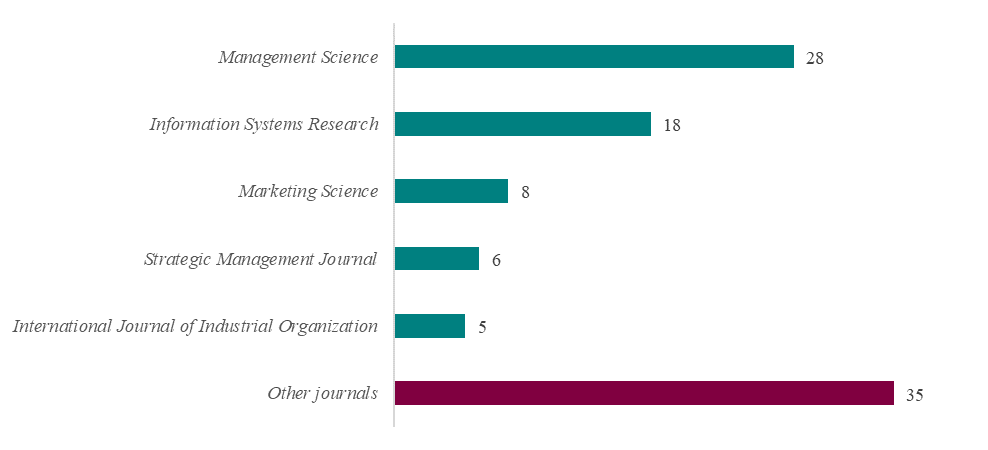
Platform papers published in 2023 analyzed a wide array of empirical contexts, ranging from Airbnb to Zillow. The empirical context that was studied most is mobile apps. In fact, mobile apps have replaced video game consoles as the “canonical” platform context. Even though research on video game consoles still is the largest empirical cluster (with 33 published articles), research on mobile apps—which, admittedly, includes a large gaming component—is now a close second (with 30 published articles). Moreover, the relative share of empirical research on mobile apps is 71% over the last four years, compared to 29% of video game consoles. The award for the most original empirical context this year goes to Farronato, Fong and Fradkin for their study on merging pet-sitting platforms, DogVacay and Rover.
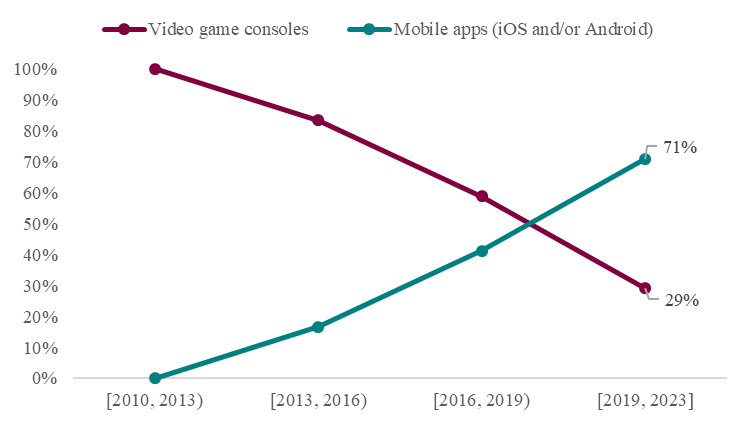
Finally, the table below lists the ten most-cited platform papers by platform competition articles published in 2023. The list includes foundational articles on two-sided markets, network effects, and ecosystems, but it also includes a recent paper by Cennamo and Santalo on platform generativity and a slightly older paper by Kevin Boudreau studying competitive dynamics within platforms, between complementors. These two papers making the list could point to the growing awareness (among scholars) that the success of platforms isn’t only defined by the number of participants, but also by their contributions and engagement with the ecosystem.
Top Ten Most-Cited Platform Papers by Articles Published in 2023
Rochet, JC; Tirole, J. 2003. Platform Competition in Two-Sided Markets. Journal of The European Economic Association, 1(4); 990-1029.
Armstrong, M. 2006. Competition in Two-Sided Markets. RAND Journal of Economics, 37(3); 668-691.
Parker, GG; Van Alstyne, MW. 2005. Two-Sided Network Effects: A Theory of Information Product Design. Management Science, 51(10); 1494-1504.
Mcintyre, DP; Srinivasan, A. 2017. Networks, Platforms, and Strategy: Emerging Views and Next Steps. Strategic Management Journal, 38(1); 141-160.
Jacobides, MG; Cennamo, C; Gawer, A. 2018. Towards a Theory of Ecosystems. Strategic Management Journal, 39(8); 2255-2276.
Wareham, J; Fox, PB; Giner, JLC. 2014. Technology Ecosystem Governance. Organization Science, 25(4); 1195-1215.
Caillaud, B; Jullien, B. 2003. Chicken & Egg: Competition Among Intermediation Service Providers. RAND Journal of Economics, 34(2); 309-328.
Boudreau, KJ. 2012. Let a Thousand Flowers Bloom? An Early Look at Large Numbers of Software App Developers and Patterns of Innovation. Organization Science, 23(5); 1409-1427.
Rochet, JC; Tirole, J. 2006. Two-Sided Markets: A Progress Report. RAND Journal of Economics, 37(3); 645-667.
Cennamo, C; Santalo, J. 2019. Generativity Tension and Value Creation in Platform Ecosystems. Organization Science, 30(3); 617-641.
Some of these themes also made an appearance on the Platform Papers Substack blog this year. Below are my personal top five platform-paper blogs published in 2023:
Debunking the myth of network effects by Chiara Farronato. This blog explains why network effects aren’t always additive but also depend on the network participants’ heterogeneous preferences. Plus, it discusses the research I mentioned earlier about merging pet-sitting platforms.
Growing platforms within platforms by Agarwal, Miller, and Ganco. This blog highlights how apps and games increasingly have network effects themselves. This adds an extra dimension to platforms’ governance strategies. It’s a topic that’s key to Epic’s fight with various platforms such as Google and Apple.
Decentralized platforms and Web3 by Hsieh and Vergne. This blog balances the pros and cons of (de-)centralized platform governance. One of the main advantages of blockchain-based platforms is that they’re decentralized, but these advantages do not apply universally. Turns out, decentralized platforms need (some) centralized management, too!
Antitrust intervention in Big Tech by Thatchenkery and Katila. With all the regulatory scrutiny of Big Tech platforms these days, it’s good to see that there is research being conducted that studies the effect of such interventions. Following a regulatory intervention targeting Microsoft back in 2001, complementors’ innovation rate went up but their profits declined…
Vertical integration of platforms and product prominence in online hotel booking by Reinhold Kesler. This blog addresses a simple but important question: Are platforms more likely to prominently feature search results from providers they own? The short answer—at least in the context of online travel agencies such as Booking.com and Expedia—is Yes. Highly relevant in lightof the EU’s Digital Markets Act.
For next year, my aim is to keep updating the Platform Papers references dashboard on a monthly basis and to bring you relevant blogposts alongside platform-paper updates. I am looking forward to the 2024 edition of the European Digital Platform Research Network (EU-DPRN) conference, which will take place on my home turf in London, hosted by the UCL School of Management.
Externally, I am sure we will keep seeing plenty of platform-related news including mergers and acquisitions, antitrust investigations, and the implementation and enforcement of legislation aimed at so-called gatekeeper firms.
If you have any feedback for me about platform papers, feel free to contact me.
Happy holidays and see you in 2024!